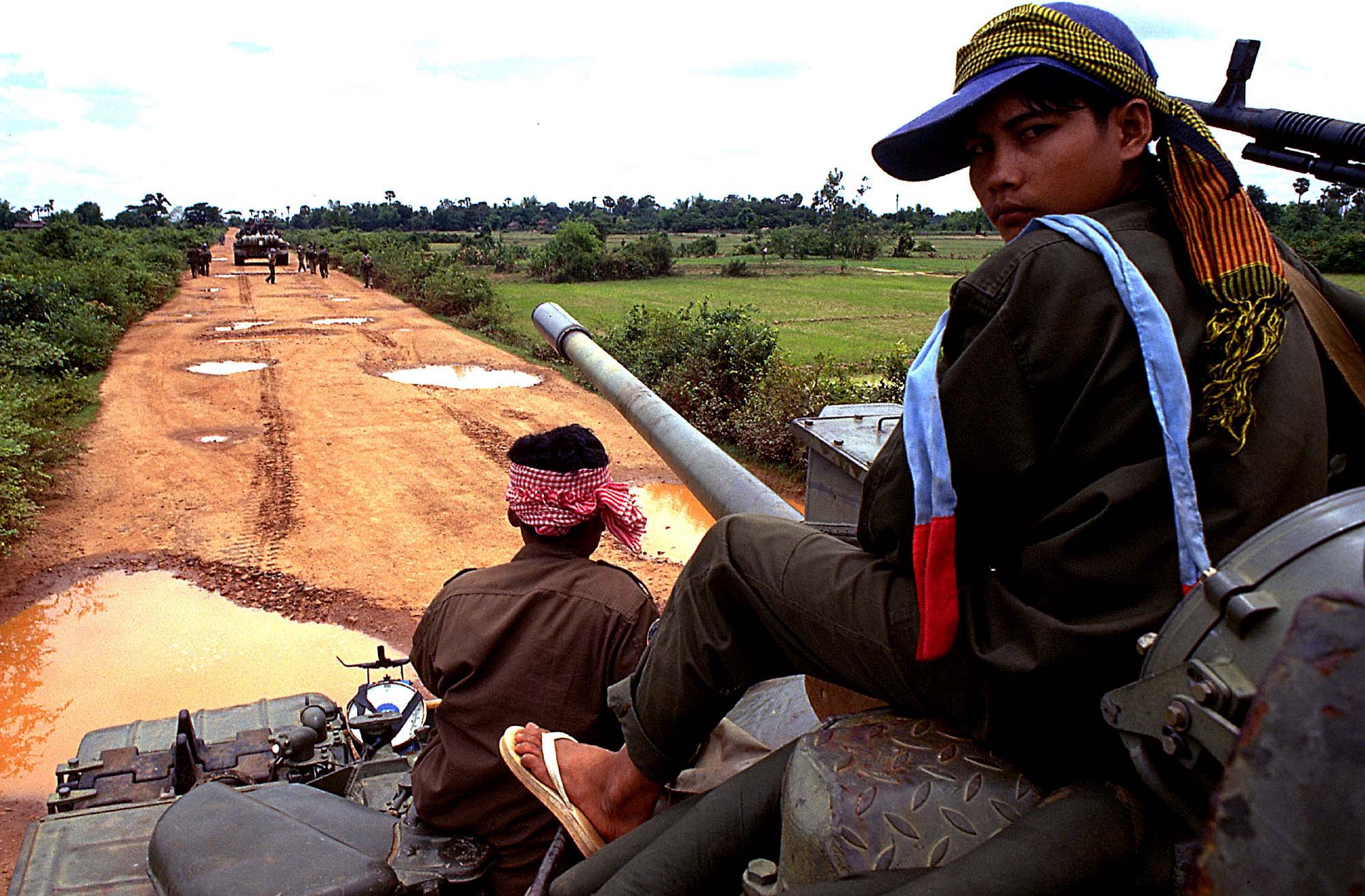War or Peace - Cambodia

War or Peace in Cambodia
Story & photographs by Andy Rain
Heavy rain clouds bring a close to another day in Cambodia’s beleaguered capital, Phnom Penh. Residents of Toul Kok, a red light district close to the city’s international airport prepare for another night with little to shelter them from the annual monsoon. While young voluptuous girls make up their faces in a makeshift hut, children rummage through the debris that once harbored their families modest possessions. The fighting that broke out in early July between forces loyal to the country’s two co premiers, First Prime Minister Prince Norodom Ranariddh and Second Prime Minister Hun Sen has left the lives of innocent Cambodian’s in tatters. The heavy artillery fire which momentarily rained down on parts of the city leveled houses killing dozens of people and left thousands homeless. “ When it rains I have no place to shelter”, says Nob Yorn, who lives in Toul Kok with her five grandchildren. The fighting destroyed her home leaving only the scorched frame of her motorcycle behind. “My property, TV, motorbike all burnt down”.
In a country where the past continues to haunt every corner of Cambodian society these painful images have brought back an eerie sense of de-ja-vu. Is Cambodia’s torturous past repeating itself? This is the question its people and a watching world have begun asking, at a time when the future was beginning to look bright for this small Buddhist nation. The heavy handed actions by Hun Sen in early July have been seen by many as finely orchestrated coup, in an attempt to take complete control of the country. Yet opinions abound in Cambodia today. Backers of Hun Sen say force was necessary to stop Prince Ranariddh from forming an alliance with the hard-line Khmer Rouge.
“ It was a timely move”, says one store owner. “ Of course their would be innocent victims, but this is a small price to pay for stopping the Khmer Rouge from ever regaining power”. Supporters of Ranariddh, on the other hand, see it differently. “Ranariddh is a man of peace”, says Kim Ann, a local taxi driver. “If the government does not hold talks with the Khmer Rouge their will always be fighting in our country”, he states.
The two premiers ferocious rivalry and continuous bickering had for years signaled a violent break up in their coalition government which formed in 1993, when Ranariddh’s FUNCINPEC won a United Nations Sponsored election. Hun Sen has labeled Ranariddh a “traitor and thief”, accusing him of infiltrating Khmer Rouge soldiers into the capital and smuggling illegal weapons into the country. Ranariddh denies any alliance with the guerrilla fighters, but says his rival is using his contacts with the group as an excuse to take power.
It is hard to judge the latest political and military events in Cambodia. Nevertheless, one thing is apparent, the majority of the population fear the prospects the Khmer Rouge regaining any political power. Most seem content to leave them in the jungles, hoping one day they will finally disappear altogether. Led by Pol Pot they were responsible for the deaths of more than a million Cambodian’s during their 1975-79 rule.
With Ranariddh out of the country seeking international support for condemnation of Hun Sen’s government, Hun Sen himself is looking increasingly confident with his strengthened position. Snubbing the world, he has reiterated not to interfere in Cambodia’s internal affairs. One thing that seems certain, is that if the two feuding leaders cannot reconcile their differences to find a bridging compromise for the good of the country, the fighting that continues in the north is likely to escalate into civil war.
Ordinary Cambodian’s don’t seem to care who started the latest episode of hostilities. “I don’t know who is right or wrong”, says Sou Con, a tour agent in the northern town of Siem Reap. “I’m just sorry that Cambodian and Cambodian fight each other”. The people of Cambodia have seen very little of peace throughout their turbulent history. The country has been plagued by war since most people care to remember. While the majority of the population have lost atleast one relative to the tragedy of conflict, the young grow up learning of their history that for many of them is too scary to even contemplate.
With the international community threatening to cut off all aid to Cambodia in a bid to push Hun Sen to hold fresh elections, the irony is, is that only the Cambodian people themselves will suffer from any foreign withdrawal. Now might be a good time for the international community to approach the current situation with more sensitivity, allowing Cambodia to settle its own matters. With years of perseverance and billions of dollars spent on trying to rebuild the country into a nation of peace, it would be a shame to see valuable aid cut off at a time when the country needs it most.
The best option for Cambodia still lies in the democratic process. Hun Sen has agreed to hold elections, previously scheduled for May, some time next year, expressing a dictatorship is not good for his country. He will now be held to his word, and must abide by the decision of such elections. They maybe the last chance for the people of Cambodia.
end


